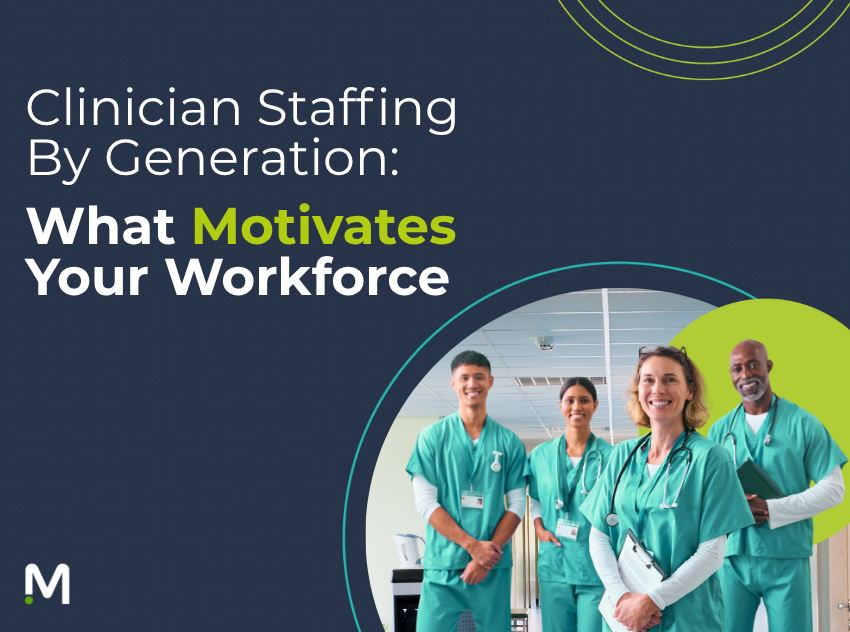
With multiple generations working side by side, each with their own values, career goals, and personal motivators, healthcare organizations must be more intentional about attracting, engaging, and retaining clinical talent. Effective clinician staffing solutions aren’t just about filling open positions; they’re about aligning the right opportunities with what matters most to the clinicians doing the work.
Medical Solutions’ recent independent study, Voices of Care: Understanding Our Nation’s Caregivers, shines a light on exactly what those motivators are. By surveying 3,700+ clinicians — including travel nurses, per diem staff, permanent staff, and internal travel contract clinicians— we gathered critical insights into how different generations prioritize their career decisions. These insights are key for hospital and healthcare leaders looking to strengthen their workforce strategies, boost retention, and appeal to today’s clinicians in a meaningful, generationally aware way.
A Generational Breakdown of Today’s Healthcare Workforce
The Voices of Care study offers a snapshot of today’s healthcare workforce, with survey respondents representing a diverse generational mix:
- 44% Millennial
- 23% Gen X
- 17% Baby Boomers
- 16% Gen Z
More than half of the respondents (54%) reported over 10 years of professional healthcare experience. They represented a diverse array of positions:
- 52% RNs
- 29% Allied Health Professionals and Technicians
- 29% CNAs
- 6% LPN/LVNs
Interestingly, job type preferences (permanent, travel, per diem, or internal travel contracts) were evenly distributed across generations — suggesting that career stage or generational identity doesn’t necessarily dictate the type of contract clinicians seek. This raises an important question for healthcare leaders: If job type isn’t the primary differentiator, what is?
The answer lies in the nuanced motivators driving each generation’s career decisions.
What Motivates Each Generation of Clinicians?
Healthcare employers often attempt to craft broad recruitment and retention strategies, but as our data shows, each generation of clinicians values different aspects of their work lives. Understanding these motivators allows healthcare organizations to better tailor their clinician staffing strategies for every age group — without deprioritizing what matters to others.
Gen Z: Flexibility and Exploration
As the youngest members of the healthcare workforce, Gen Z clinicians prioritize having control over their schedules, locations, and career paths. Notably, they show the lowest interest in job stability or staying close to friends and family, reflecting a generation focused on exploration, experience, and work-life integration.
Key motivators:
- Flexible scheduling
- Career mobility
- Diverse assignment types
- Modern, adaptable employers
Millennials: Pay and Security
Millennials, now the largest segment of the healthcare workforce, also value flexibility, but not at the expense of financial security. According to the Voices of Care report, competitive pay packages are their top motivator. Stability also ranks high, reflecting their life stage of balancing career, family, and long-term financial goals.
Key motivators:
- Strong pay packages
- Comprehensive benefits
- Advancement opportunities
- Loan repayment and wellness perks
Gen X: Freedom Over Familiarity
Gen X clinicians, many of whom are in leadership roles, value flexibility for maintaining work-life balance. They prioritize personal freedom and control over their schedules and work environments.
Interestingly, this generation showed the lowest interest in workplace diversity initiatives compared to other generations, signaling that autonomy and professional respect carry greater weight for them.
Key motivators:
- Scheduling control
- Clinical autonomy
- Leadership opportunities
- Work-life balance support
Baby Boomers: Relationships and Familiarity
While a smaller share of the clinical workforce, Baby Boomers remain essential, often serving as mentors and specialists. They value staying close to friends and family and are less motivated by pay than their younger peers.
Key motivators:
- Community and connection
- Consistent schedules
- Mentorship opportunities
- Flexible phased retirement options
How Clinicians Search for Jobs: A Blend of Traditional and Digital
One unifying insight from our Voices of Care study is how clinicians of all ages look for jobs. Across generations, respondents reported valuing both personal connections and modern digital platforms.
They appreciate:
- Recruiter support and word-of-mouth referrals
- Easy-to-navigate job search technology
- Mobile-friendly applications and instant job alerts
This dual preference underscores why healthcare organizations benefit from working with a healthcare workforce solutions partner offering high-touch service and cutting-edge digital tools.
How to Respond in Your Healthcare Facility
To strengthen recruitment and retention strategies, hospitals and healthcare systems can adjust their approaches based on these generational insights:
- Customize job offers and benefits. Highlight flexibility for Gen Z, pay for Millennials, autonomy for Gen X, and community for Baby Boomers.
- Offer a variety of work options. Include permanent, travel, per diem, and internal travel contracts to meet diverse clinician priorities.
- Modernize recruitment efforts. Blend personal recruiter outreach with digital job search tools to appeal to all generations.
- Invest in career development. Provide leadership training, specialty certifications, and mentorship opportunities.
- Celebrate and recognize contributions. Tailor rewards programs to appeal to each generation, from financial bonuses to public recognition.
Choosing the Right Healthcare Workforce Partner
Meeting the needs of a multigenerational workforce takes more than what a typical healthcare staffing agency provides. Healthcare systems benefit from partners who combine data insights, technology, and a broad clinician network to support evolving workforce strategies.
Healthcare workforce providers offering contingent staffing, managed services, internal float pools, international recruitment, and virtual care can help healthcare systems manage labor costs, strengthen operations, and improve patient care.
Your Strategic Advantage
Generational preferences in the healthcare workforce aren’t just an interesting data point but a strategic advantage. By understanding what motivates Gen Z, Millennials, Gen X, and Baby Boomers, healthcare leaders can tailor clinician staffing solutions to attract and retain top talent, improve clinician satisfaction, and deliver better patient care.
When you meet clinicians where they are with the benefits, flexibility, and recognition they prioritize, you not only fill open roles but also build a workforce prepared for the future of healthcare.
Contact Medical Solutions to learn how we support hospitals and healthcare systems with a truly partnership-driven approach.



